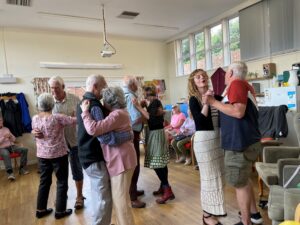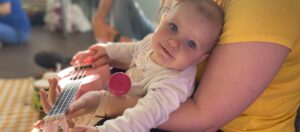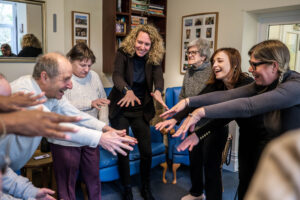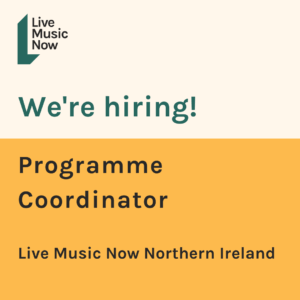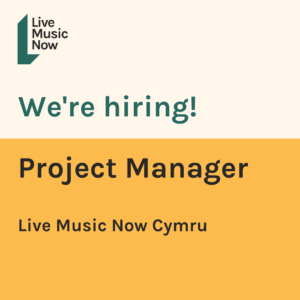Chief Executive Janet Fischer and Live Music Now musician and award-winning singer/songwriter Thomas Harvey talk about queer identity and the creative process.
Janet:
Hi Tom. Lovely of you to come and chat to me today. Everyone who’s watching this, I’m Janet Fischer. I’m the Chief Executive of Live Music Now, a national organization connecting people through power of music.
It is our 45th year, and this month, June, is really important to us as an organization, but also to many of our musicians, especially those in the LGBTQIA+ community, because it is Pride month. I am so delighted to be joined by Tom, who’s going to introduce himself to you all. We’re going to talk a little bit today about how our identity as queer people affects our creative process, how our creative process helps us explore who we are as people and how that personal exploration helps us connect people in the community with the places that they’re from and the people that they are. So first I’ll hand over to you, Tom. Tell us a little bit about yourself.
Tom:
Sure. Yeah, firstly, thank you so much, Janet for having me be here as part of this conversation. I really appreciate it. I love working for Live Music Now, it’s such a special place to be involved as a musician. But yeah, my name is Thomas Harvey or Tom. I am an award-winning singer, songwriter, artist. I have an artist project under the name T Priestly. Multi-instrumentalist, music journalist sometimes. A few things in the world of music as all of the musicians on the scheme will be well acquainted with. Lots of fingers in lots of pies.
Janet:
I don’t think really anyone anymore gets to say, “All I do is perform.”
I myself, I’m a musician, I’m a trained opera singer. I jumped to the other side of the desk a few years ago, but I still consider myself to be a musician. And this is all part of a great portfolio career. I think it’s really important that we’re able to actually talk about that in this industry. That it’s not just about doing only one thing and pigeonholing ourselves into this is what I am and if I don’t headline Glastonbury, I’m not a successful musician.
Tom:
Yeah, I think it’s interesting how, when you first kind of start that musician journey, this sort of like horizon in your eyes is always ‘the performance’. It’s what you see as the sort of benchmark, I suppose.
And then I realized that being a musician is being so many things. Sometimes it’s a whole day of just sitting and replying to emails. Sometimes it’s doing a really amazing gig, where you get to perform like in a place that you never imagined. Or sometimes it really is just as simple as just like practicing songs at home on a piano. Or rewriting, or there are so many different ways to be a musician. That’s also a beautiful thing I think, is that there are so many elements in music to be a part of.
And that’s kind of how I found Live Music Now, when I left university and I was looking at the ways that I could kind of like be involved in music, support myself and also just do some good in music as a community. And I found Live Music Now, and it just was something that fit perfectly into that world of having all these avenues to explore and be a part of. And here we are.
Janet:
Great. We’re delighted that you are here. I think going on from that sort of theme of exploration, it’s something that we’ve been doing as an organization too. Most of the time, as you know, Live Music Now works behind closed doors, whether that’s in a special school, in a hospital, in a care home. And we’ve started in the last 12 months to really think about, how do we take this work into the wider community?
We’ve been doing a lot of work recently around exploring heritage and a big part of that is also about exploring identity. That’s one of the things you and I wanted to talk about today is understanding how where we’re from connects us to some extent with our identity or molds our identity. And so I think it would be really interesting to understand, how you feel that your identity of who you are, where you’re from, the things that you really love, how do those aspects of your personality and your identity influence your creative process? And I guess the other way around, how is your creative process influencing your identity?
Tom:
That’s a really, really great question. I would say it took me a long time, I think, to really embrace what identity meant to me. How to really attach myself to identity, but also sometimes to let go of what it means…
When I was younger I didn’t want to identify with my queer identity. I didn’t want to be a queer person because it didn’t feel like it was something that I would be appreciated for, I suppose.
And it’s interesting because I say that because now my life is so focused on what being queer means to me and how my identity is wrapped up in that. In my work, in my day to day, in my friends, in the events that I attend, in the people that I champion and I idolize. My life would be completely different if I didn’t really attach myself to that identity.
And that really takes complete hold in my creative process as well now, because my collaborators, many of them are queer people or identify as queer themselves. The songs that I write, the themes and how I shape those songs is very much based on how my early adulthood was shaped by that identity.
And for a lot of young people who are going through it now, I mean, there is always progress, but progress comes with struggle, and it comes with discussion, and it comes with activism. And without continually doing those things, it’s not like, oh, we won the battle, now there’s a big party. The battle is consistently raging all across the world internationally.
I feel like maybe I’ve gone into a tangent, but I guess the main thing that I wanted to sort of like stress is that the place where I grew up, the person I am wholeheartedly shaped my creative process. And the projects that I’ve started doing recently with Live Music Now are allowing me to really take that into a new essence and a new form, but relate back to my sort of ideology and my previous work that I do as a writer.
Janet:
That’s really interesting. And how are you finding it about connecting then your identity with a sort of a community identity? We’ve been doing a lot of work together in Chatham Intra. You’ve been working recently in Gillingham in the Medway towns. You’re from Maidstone yourself, so not that far. How are you finding that it is to connect?
Having spent so much time working on your own and understanding your own identity and that being such an influence in how you create music and create your art. How do you find connecting that to other people? Especially when we’re talking about sort of wider community sentiments around how people feel about where they’re from and who they are?
Tom:
Yeah, I mean, I think as a musician, who’s been doing music since I was a tiny little kid. I guess when I grew up, it was always my crutch to stand on and my way of lifting myself up. And I kind of just like completely enshrouded my world in music. It’s just all I do. It was all I ever did. And I suppose by doing that, it means that my life and the places that I visited are always marked by music. They’re always marked by the music that I listen to. They’re always marked by the music that I make. And I think to be able to go to a place and draw on someone’s memory and make that memory into music is something that I’ve always just really likened myself to do.
Tom:
And to be involved in, like the most beautiful part of music for me is quite often memory. It’s the memories I have of listening to a specific song in a place that benchmarked a key moment in my life. Or a song that I think about all the albums I listened to at home, that got me through some really amazing times and got me through some times that weren’t quite as enjoyable. And I found solace in music. And by going into these communities and especially kind of the work I was doing in Chatham at Age UK, we were really drawing on memories that were really fond memories for the participants. And like seeing the excitement and the enthusiasm that they kind of like had when we would discuss what those memories were, what this place meant to them. It’s a really special thing to take that place, take that description and give it music. Give it the life of music and make it into a song.
Tom:
And I think it’s something that people who don’t necessarily have that music day to day in their lives all the time, it’s really special for them to see those memories be lifted into a song that they can then, which is what we did. We performed this song after however many sessions we did, maybe four or five. It’s really special to see that come into fruition. And to just enjoy the fact that music comes in so many facets, it starts with a concept or a memory. And then over a period of time, it comes into a performance and it is taking all of those different elements and putting them into one piece and one really exciting outcome.
Janet:
Yeah. And I mean, it was a beautiful song. It’s the new theme song around the office. We’re happy to share the video of it later when it’s been launched by Medway. I guess what’s it like to help someone explore their creative voice? Especially if I think maybe older people. I think there’s a sense sometimes that we get to a certain stage of life and things are sort of, it’s a stop. We’ve reached the sort of point and then, now it’s just a sort of a gentle decline or a less gentle decline depending.
Janet:
And we’ve been talking a lot as an organization about the fact that creativity is whole life and that we can learn things and be creative all the way up to the very last moments of our lives. And so I think working in Age UK, especially with older people, what was that like? What’s it like helping people find almost their musical voice again?
Tom:
Yeah. I mean, it’s really, really special. And I completely agree. I think with creativity, it doesn’t matter what age you are. The element of creativity is what really makes us feel alive. And it comes with so much joy and it really boosts moods. You can see the sort of places where I’ve played music. I think of like SEN Schools as well in particular, where I have seen the mood of a room completely change just by singing one song. It’s like, I haven’t really seen that clear, immediate effect anywhere else. Even at like a really, really big, big performance or a big gig it’s still special. It’s always a really special feeling in any capacity, but really seeing how somebody’s mood can change so dramatically just when they hear a song or they hear a voice singing is so special.
Tom:
And in that example of being with Age UK and lifting those memories up into the stratosphere, it was nice to see how those memories remain present. Although, they are past memories by giving them music, it’s like you revitalize them. To see the enthusiasm when people talk about their lives, they talk about them fondly, but sometimes they talk about them like, “Oh, I wish that I could still be there involved in that thing that I was doing.” And when you take it and you put it into a song, it’s almost like you’re giving that moment back to somebody to reinvent, to regenerate. That in itself is just such a beautiful way to look at creativity. Creativity is renewal. It’s not just doing something in a specific moment. It’s about learning and growing and developing and just having fun with it. That’s really important to remember.
Janet:
I love that thought of creativity as renewal. Now, pulling that towards you and talking about Pride month… What’s it like? We’ve talked about the creative process being part of shaping your identity and your identity shaping your creative process. What’s it like now to come back to some of your repertoire? Some of the music that you’ve created when you were younger? Perhaps when you were in that process of better understanding who you were as a person. What does that feel like as an artist to sort of come back to that older music that’s tied to a Tom who was still working out who he was?
Tom:
It’s a very reflective experience. I’ve just finished an album and I find the music that I make now is very much based on a lot of that past reflection, but also now really, really forward thinking. It kind of feels like freedom. I went through a long period of not really being sure who I was or the identity that I had created myself, because I was wanting to escape what it meant to be a queer person. And so a lot of my music for a long time was very sad. I was making a lot of sad music honestly, which was fine. It was a period that I needed to go through.
I don’t hold any regret. I don’t hold any resentment. I just kind of looked back at it. And I’m like, “Tom, I wish that you’d been a bit nicer to yourself in that time.” But in all honesty, the music that I was creating was the kindness that I needed. And those sad songs were the emotions that I sometimes didn’t want to voice to anybody else.
But the way that I have changed… it’s unbelievable. Really, it’s crazy the work that I’ve put into myself to make sure that kindness is clear. And now, instead of kind of reflecting on those emotional moments, sort of like therapising my music in a way, the music that I make now it’s much more about freedom and the party. In a sense of like celebrating what it means to be you, celebrating what it means to be a queer person. And taking that into a place that’s almost quite dancey. It’s almost quite like dance music, which is exciting. It just shows that the journey is continually changing. And like you said, creativity is forever present, but it’s forever present in different states, in different moments, in different places.
Janet:
Yeah. Wow. And I mean, I guess thinking about Live Music Now, also about journeys and pathways for professional musicians. I mean, you joined us as an emerging artist, you’re now very much established. And we are part of the journey of many emerging musicians. We’re also some of the work we’ve been doing in the past years is also understanding that actually we don’t just need to be for a emerging artist. And that whole careers, that people come to the kind of work that we do at different stages of their careers. And that it’s actually, it’s a great thing to be able to create a community where people who have something to learn or something to share in this practice of music that we do can come to that at different stages of their careers.
But I think one of the bigger questions we’ve been tackling and understanding is the thing we talked about before. About that, what does success mean? Are you a successful musician if you haven’t headlined Glastonbury? Or if you won’t. That being a musician sometimes actually is spending a day answering emails and you probably do need to finish your invoices if you like to get paid by somebody at some point.
And thinking, reflecting on that comment that you said about, “I wish I could have been a little bit kinder to myself.” What are your sort of thoughts for potentially someone that you might be mentoring or as an emerging musician? And potentially also, a young queer musician that’s coming through and going through some of the similar process? It’s not going to be the same, of course. None of us have the same journey into understanding who we are and where we fit in this world and finding the people we belong with. But what would be your sort of… If Tom now could talk to Tom version two 10 years ago. What are the sort of moments of things that you would draw out for them?
Tom:
Yeah, really, really, really good question. What advice would I give? I suppose I would say patience is a really key word, a word that I used to despise a lot. My manager would always say to me, “Patience, Tom.” And I’d be like, “Please, can we just release the music now?” And it’s like, now I’ve been sitting on this music for a long time and I’m happy and content in that patience. I would say that, “Good things come to those who wait. And it’s okay to realize that things will get better if they don’t feel like they will in a moment”, if that makes sense.
I would say, “Find your community.” It might seem like it’s really hard to find that community. I really struggled to find a community of people that I really felt like I could open up to and feel like I could belong, but I did find it. And when I found that it really changed a lot. Going to gigs, going to events, networking events, finding those people and finding like-minded people in an essence.
And then I’d say like, just the self-care stuff. It’s very easy as a musician to never start. We were having this conversation before to continually just like work day and night and not take a break and scheduling those breaks is incredibly important. And it’s very easy to forget. I forget all the time. And then I get to a point where it’s kind of like a boiling point and I’m like, “I really need to take a break and I will take a break.”
But actually finding time to take that break and to look after yourself is also really important because as queer people as well, we can very much teeter on the edge of how to really look after our mental health. And mental health is something that, it’s not easy to see that we’re not nurturing it until again, you’ve reached a point where it’s not good. It’s not in a place where we’re really looking after it and caring for it.
The rates of people with really, really bad mental health in queer communities is not good. And so it’s really, really important to make sure that we look after each other and we check in with each other and we’re aware of various ways that we can nurture and look after ourselves. And we surround ourselves with good people.
Janet:
Yeah. I think it’s also recognizing too that as creatives and as people that put ourselves in the public eye, to some extent, even if for a small community of people, we are role models. And the people who are around us even our three closest friends, they’re going to be influenced by what we do. And we’d say to our best friend, “Look, you really need to just take a day or two off. It’s okay to have a break.” But we don’t say that to ourselves because we do have this sense. I completely agree with you. There has been this culture built up in the music industry that says, “We can’t stop. You can’t say no.” And actually that’s not true. The reality is you can stop. You can say, “No.” And the work will still be waiting there for you.
Tom:
Very good point.
Janet:
It’s important that we recognize that there are always people watching. And especially in the queer community about understanding that there are always younger people watching, who are at that moment going, “You keep saying this will get better. Does it actually get better?” And if we present this face that says, “I’m just going to run all the time and I’m never going to stop until I eventually collapse…” That’s not painting a very healthy role model. It’s not really painting a great picture for the people that are watching us. And I think, that is really important.
And it’s something that we’re working with organizationally too, about how do we really support musicians in the work that they do? The reality is that we are asking musicians to go into settings where they build relationships with people. And sometimes throughout the duration of those relationships, especially working in something like a hospice or a care home, it’s possible for someone you’ve been working with for a year that they might pass away.
We have to understand that we are building really deep connections with those people, as we’re building a musical and creative connection. And that we need to really support our workforce and our musicians in managing that complex layer of emotions. Where there’s the joy that we’ve been able to be part of their creative process, but also the understanding that all those relationships have a real impact on us as people. I think yeah, that really, that really resonates with me that need to say, “Hang on here. I need a minute.”
Tom:
We need a breath from the pressure. Yeah. Just for a second.
Janet:
Yeah. Just for a minute. Well, I mean, it’s been amazing talking to you. I guess the big question for me at the end of all of this is, what’s next for you?
Tom:
Yeah. So, this album is finished. I’ve recently kind of changed the direction of the main sort of artist project that I’ve run. So music will be coming very soon through that avenue, which is under T Priestly with a kiss at the end, a little x. And yeah, I mean, apart from that under Thomas Harvey, I’m obviously kind of involved in multiple amazing projects with Live Music Now. I’m really, really excited to be kind of furthering my writing in community projects and to bring these stories and narratives to life.
Tom:
I do a lot of production and writing, fulfillment TV, so lots of stuff like that coming out. And yeah, I mean, it all feels very exciting again. It feels like summer really drives forward that enthusiasm for being a performing musician, but also, I guess, just for thriving in inner city, being a musician and being creative. The glory of being able to be creative as a job is, I mean, it’s always hard and I need to take those breaks, but it’s such a beautiful thing. And to be able to take that creativity and put it into other people’s hands is something that I think is so fundamentally important to being a musician.
Janet:
Aw, well, we are so delighted that we are part of your wider career, your portfolio of work, as we say in the music world. And can’t wait to hear that new album, looking forward to it when it gets released. And thank you so much for taking the time to talk to us today and sharing so openly about your experiences and your process.
Tom:
Thank you so much for having me.
Janet:
Cheers.
